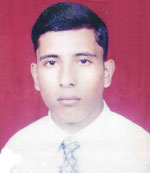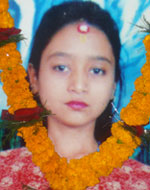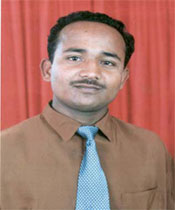Related Links
Case Updates
Krishna Adhikari
 On 6 June 2004, Krishna Prasad Adhikari, a resident of Fujel village of Gorkha District, was murdered in Chitwan District by Maoist cadres. Krishna Prasad was visiting his grandparents after having taken the SLC examinations, and he was abducted from Bakullahar Chowk by men who came on a motorcycle ...
On 6 June 2004, Krishna Prasad Adhikari, a resident of Fujel village of Gorkha District, was murdered in Chitwan District by Maoist cadres. Krishna Prasad was visiting his grandparents after having taken the SLC examinations, and he was abducted from Bakullahar Chowk by men who came on a motorcycle ... Maina Sunuwar
 Around 6 am on February 17, 2004, a group of RNA soldiers arrested Ms
Maina Sunuwar, a 15-year-old schoolgirl of Kharelthok VDC-6, Kavre
district. She disappeared since her arrest. Her family members, with
support from villagers and school where Maina was a student, visited
detention centers ...
Around 6 am on February 17, 2004, a group of RNA soldiers arrested Ms
Maina Sunuwar, a 15-year-old schoolgirl of Kharelthok VDC-6, Kavre
district. She disappeared since her arrest. Her family members, with
support from villagers and school where Maina was a student, visited
detention centers ... Sanjeev Kumar Karna
 Sanjeev Kumar Karna was one among the 11 persons arrested on October 8, 2003. On that fateful day, they had gone to attend a picnic program organized by the students at a place called Kariyachauri VDC-4, and from picnic, they went to Kataiya Chowri Area of Dhanusha district where they ate some food ...
Sanjeev Kumar Karna was one among the 11 persons arrested on October 8, 2003. On that fateful day, they had gone to attend a picnic program organized by the students at a place called Kariyachauri VDC-4, and from picnic, they went to Kataiya Chowri Area of Dhanusha district where they ate some food ... Arjun Bahadur Lama
Arjun Bahadur Lama, 48 years in age, permanent resident of Chhatrebas
VDC -5, Dapcha in Kavre district was abducted by a group of Maoist
cadres, three in number, on 29 April 2005 (2062.1.16 BS) from the
premises of Sri Krishna Secondary School at Chhatrebas VDC-1 of the
district.
» more
Hari Prasad Bolakhe
Hari Prasad Bolakhe, 35 (while missing) a permanent resident of Phulbari VDC-8, Kavre district, a pastor by profession, had been missing since the arrest December 27, 2003, was reportedly killed by security persons. A team of National Human Rights Commission discovered a human skeleton in a jungle ...
» more
Sarala Sapkota
Around 11 p.m. on July 15, 2004, a group of 12 armed soldiers arrested
Sarala Sapkota at her grandfather’s house. The family, who witnessed the
arrest, stated that soldiers gave Sarala no reason for her arrest.
After her arrest, Sarala’s family went to Baireni barracks and the DPO ...
» more
Birendra Shah
On the evening of 5 October 2007, Mr. Birendra Shah, 34, resident of Inruwasira VDC-8, Bara district, a local journalist of Bara district and correspondent of Nepal FM, Avenues Television and Dristi weekly, was abducted by Maoists from Pipara Bazaar in Kalaiya, the district headquarters of Bara ...
» more
Bishwanath Parajuli, Tom Nath Poudel and Dhan Bahadur Tamang
Three persons namely Bishwonath Parajuli (also called Nagendra
Parajuli), Tom Nath Poudel and Dhan Bahadur Tamang of Hasandaha VDC,
Morang were shot dead by the security personnel on 28 September 2004.
According to the eyewitnesses, other victims and the villagers, about 16
people were arrested ...
» more
Chot Nath Ghimire and Shekhar Nath Ghimire
Chot Nath Ghimire, a 58-year-old farmer, resident of Ishaneshor VDC-4,
Ratamate Majhpokhari of Lamjung district was allegedly arrested by the
Joint Security Forces of Joint Security Camp stationed at Bhorlatar VDC,
Lamjung district on February 2, 2002 (2058.10.20). The security camp
called Mr. ...
» more
Bhauna Tharu
Bhauna Tharu (Bhauna Chaudhary in the citizenship card), 21 years old
male (at the time of the incident; Date of Birthe: 8 September 1978),
son of Purna Bahadur Chaudhary, permanent resident of Sujanpur village,
Neulapur VDC-4, Bardiya district, and an employee of Rastriya Gobar Gas,
Gulariya, ...
» more
AF-AHRC Organize Seminar on Rule of Law and Criminal Justice

In the seminar titled 'the Rule of Law and Criminal Justice', the discussion was focused on a wide-ranging issues including civil liberties, opportunities, income of people and a large number of issues relating to the recent developments in Nepal.
In terms of civil liberties, the participants appreciated the expansion of freedoms in Nepal, especially people's freedom of expression after the 1990s. Observing the situation in terms of civil opportunities, the participants held that new opportunities may have risen for the small group of people in power and those close to them but that the ordinary people only marginally benefited from such opportunities and also the rich, the powerful and the politically influenced have made gains through the means of income whereas the poor, still, continue to depend on foreign remittance.
The participants observed that while some democratic achievements have been made in the area of development of the basic institutions, there is no attempt at all to bring about comprehensive reforms. The talk of the democratic reforms has not translated into efforts to improve the basic institutional structure of justice in Nepal.
There were lengthy discussions on the situation of the police. The participants concluded that in Nepal there is hardly any discussion focusing on improving the policing system in the country. They believed that human rights abuses like arbitrary arrest and detention, torture and extrajudicial killing form an integral part of its functioning and due to a lack of independent system of investigation into the complaints of abuses by the police, victims are deprived of justice they are entitled to.
Several lawyers also raised concerns over the repeated threats and disrespect from the police while making intervention on behalf of their clients. They opined that much improvement is needed in building a professional relationship that respects the rights of the clients as well as the lawyers. Institutional reforms, including police reforms, have not yet become significant part of discussions and debates in the political discourse. Several participants felt that action is required to trigger public discussions on the issue of such reforms.
« Back to overview
In terms of civil liberties, the participants appreciated the expansion of freedoms in Nepal, especially people's freedom of expression after the 1990s. Observing the situation in terms of civil opportunities, the participants held that new opportunities may have risen for the small group of people in power and those close to them but that the ordinary people only marginally benefited from such opportunities and also the rich, the powerful and the politically influenced have made gains through the means of income whereas the poor, still, continue to depend on foreign remittance.
The participants observed that while some democratic achievements have been made in the area of development of the basic institutions, there is no attempt at all to bring about comprehensive reforms. The talk of the democratic reforms has not translated into efforts to improve the basic institutional structure of justice in Nepal.
There were lengthy discussions on the situation of the police. The participants concluded that in Nepal there is hardly any discussion focusing on improving the policing system in the country. They believed that human rights abuses like arbitrary arrest and detention, torture and extrajudicial killing form an integral part of its functioning and due to a lack of independent system of investigation into the complaints of abuses by the police, victims are deprived of justice they are entitled to.
Several lawyers also raised concerns over the repeated threats and disrespect from the police while making intervention on behalf of their clients. They opined that much improvement is needed in building a professional relationship that respects the rights of the clients as well as the lawyers. Institutional reforms, including police reforms, have not yet become significant part of discussions and debates in the political discourse. Several participants felt that action is required to trigger public discussions on the issue of such reforms.
























Join Us